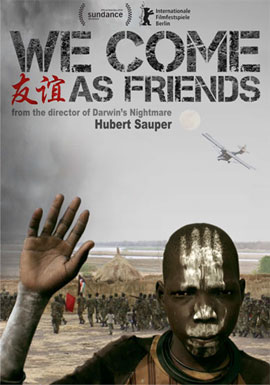We Come as Friends is a powerful and troubling documentary that portrays the struggles of South Sudan to deal with economic exploitation and tribal violence during and after its 2011 campaign for independence from northern Sudan. Six years in the making, the film contrasts the lives of those affluent foreigners seeking to make fortunes in the country, those offering humanitarian aid, and the local villagers who call it home. An early scene in the film shows a funeral with villagers flinging themselves face down onto the packed earth grave of a man recently shot dead - a harbinger of the pitiless story to come. “The more you scratch the surface,” said the film-maker Hubert Sauper at a Q&A after the screening, “the more you learn what you sometimes wish you never learned.” A documentarian from Austria, Sauper’s last film Darwin’s Nightmare that was shot in Tanzania was nominated for an Academy Award in 2004.
In a series of blunt depictions, Sauper showcases the varied and linked lives of those affected by their new-found, unstable independence. From the Arab Sudanese worker at a Chinese oil drilling facility saying "everything is good - no need USA here,” to the Chinese workers at the facility not relating to the local villagers and playing pool in their air-conditioned bullet-proof club, people seem to live in bizarre states of unreality. Nearby villagers complain the waste water from the Chinese plant kills any chicken that drinks it, and a Sudanese woman brought up on the land in turmoil says "my father and mother were buried here, but the place no longer belongs to me."
Sauper gained access to South Sudan via a small, ungainly airplane he helped design himself. “We literally dropped from the sky into the oil fields,” Sauper said describing his plane as a “Trojan horse.”
In what Sauper says is the “most shocking moment” of the film to many people, American missionaries arrive saying, "I guess God is calling Texans to South Sudan." The scene continues with a missionary woman forcing a young boy, accustomed to walking barefoot, to wear white socks and sandals while trying to get him to dance as he wails in terror. Elsewhere villagers are displaced by foreigners buying up land for mining or timber, while conflict between rival tribes flares up into outright civil war.
“Many villages where we’ve been are no longer there,“ said Sauper at the Q&A following the screening. “Millions (of people) are on the move. Hundreds of thousands are missing. Tens of thousands are reported dead. Uncountable women are raped every day. Uncountable children are abducted to be soldiers.”
In the audience at the screening was surprise guest Celestina Laku, whom Sauper filmed in Sudan before she fled the country out of fear of political persecution. She sang a protest song “My Land” which criticized the new government in the South and expressed her disillusionment with the new regime. “What I saw, this is real,” said the mother-of-seven after watching the film for the first time. “This is a wakeup call for everybody.”

